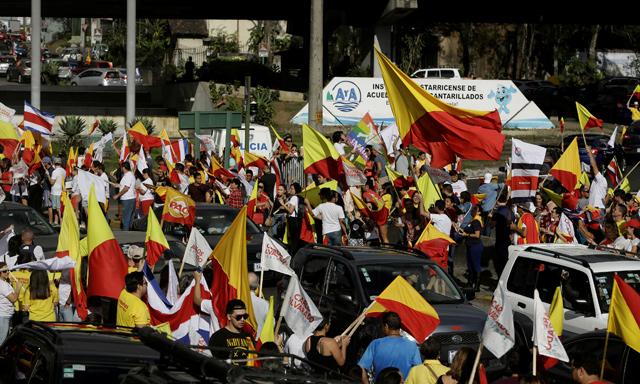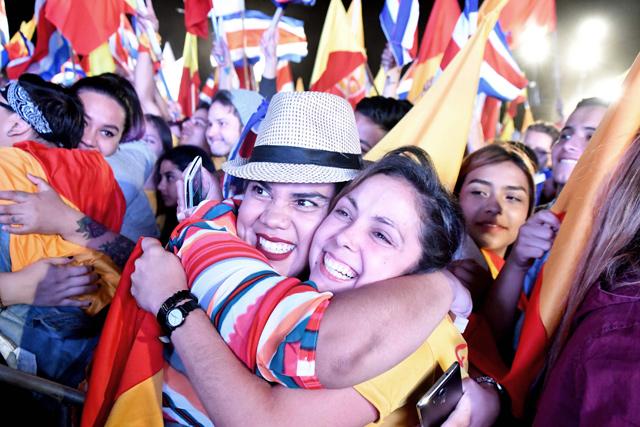You are here
Divided over gay rights, Costa Rica chooses new president
By AFP - Apr 01,2018 - Last updated at Apr 01,2018

Supporters of Carlos Alvarado Quesada, presidential candidate of the ruling Citizens' Action Party cheer before a second-round presidential election run-off in San Jose, Costa Rica, on Saturday (Reuters photo)
SAN JOSE — Polling stations across Costa Rica opened early on Sunday for a presidential election that has split the country between an ultra-conservative evangelical preacher who slams gay rights and a former minister from the centre-left ruling party.
The result will decide who rules the small Central American nation of five million people for the next four years. Pre-vote surveys suggest a neck-and-neck race between Fabricio Alvarado, a right-wing 43-year-old preacher, journalist and singer, and Carlos Alvarado (no relation), a 38-year-old former journalist who was a labour minister in the outgoing government.
Fabricio Alvarado surged from nowhere in the first round of the election held in February, triumphing over a field of 13 candidates by fiercely criticising gay marriage.
The Inter-American Court of Human Rights in January urged the recognition of same-sex marriages, setting off a polarising debate in Costa Rica. The country is both socially conservative and proud of its progressive human rights record.
A 'photo finish'?
Carlos Alvarado, in contrast, ran on a broad campaign to tackle the priorities identified by his Citizens' Action Party, which has been in power since 2014 under outgoing President Luis Guillermo Solis.
Those issues include reining in a steadily climbing deficit, boosting education and upholding ecological standards.
In the first round, the preacher won 25 per cent of the ballots against 22 per cent for the former labour minister — both well short of the 40 per cent required to avoid a run-off.
The last pre-election survey in March suggested a very tight election: Fabricio Alvarado was credited with 43 per cent support against 42 per cent for Carlos Alvarado.
"Neither of the two candidates motivates me sufficiently to give my support," the head of the small Liberal Progressive Party, Eli Feinzaig, wrote on his social media accounts.
"But, ultimately, one of them has done enough to earn my clear and unequivocal repudiation," he said, declaring he would vote for Carlos Alvarado.
Winning over undecided or ambivalent voters was key for the candidates.
"The population still isn't clear on what development model it wants," a political analyst from the Latin American Social Sciences Institute, Gustavo Araya, told AFP.
"This is a photo finish. It isn't statistically clear who will be the victor between these opposing platforms," he said.
Some 3.3 million voters were being called to decide the election.
Polling was taking place on Easter Sunday, at the end of a four-day holiday weekend. Roads back to the capital San Jose were choked as many voters drove back home to cast their ballots.
Others had yet to make up their minds.
"Voting is so difficult. The two who are left aren't to my taste. I don't know if I'm going to vote. Truly, I'm undecided," said Ligia Vargas, a street vendor who sells fruits and juice in the main city park.
Related Articles
SAN JOSÉ — Costa Ricans began voting on Sunday to elect one of two scandal-tainted presidential candidates in a country grappling with sky-h
SAN JOSE — Costa Rica’s President-elect Carlos Alvarado Quesada ran up a bigger-than-expected margin of victory in Sunday’s run-off election
His Majesty King Abdullah on Thursday sent a cable of congratulations to Costa Rica’s newly elected president Luis Solis.

















